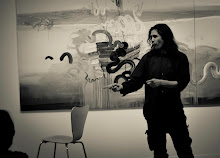However this is such a pity, for as both Hegel and much later Deleuze noted, Kant's ideas, taken in themselves are both pithy, and also have a violent urgency all of their own, Take for example his very famous division of the self into Empirical and Transcendental aspects - that is into our living self (in day to day life), and that which demands that to live at all, to have an experience, we must be a single self. It is a division which sets up or at least expresses, a profound schism in everything one is or could be. For the Empirical self, my life, based on memory and feeling is always someone less than that other self, the one that patterned the world and allowed me to be. Who I am is necessarily unworthy of whom I also am - the meta-me. The result of course is that the empirical self is always changing, and evolving, while feeling it is never good enough, never complete in the face of that other-me which in forming my world demands of it (and me) more than can be expressed in any experience. The problem is seen clearest in the Sublime, where logic demands the transcendental appear in the world, and rends experience, making the act of comprehension impossible and even painful. A feeling that Kant then says is only placated in Art, which the Meta-me cannot master or fully grasp.
Here then in a nutshell, is very much the modern human experience. One is both at any one time the result of a certain subset of experiences and habits, and yet always aware that there are other things one was, and will be. From which it is follows that is is impossible to ever feel one has truly reached one potential, for the world might be (transcendentally) what the self makes, but it is what (empirically) makes the self. A doctrine, as full of poignancy as it is full of madness, modernity and necessary futility.
What is more, this same entanglement, with the same doubling of transcendental and empirical, infuses much of the way we understand the world, much of the way we dress it up and think it. Take for an example so much of traditional economics, where the lusts and desires of an notional self-interested individual, are abstracted and somehow writ large across a population (who all are hence forced become self-interested consumers). And this mandate is then used to attempt to comprehend (or at least contain) all of the highly complex interactions, developments, and innovations that pattern our working and leisure lives. Hence we take one aspect of what we are, render that aspect transcendental, and then think the world through that glass. The Myth of the Market, becomes a reality. The resulting doctrine only succeeds, in that the constant flux of that which the myth grasps at, means that the advocates of the transcendental doctrine, can endlessly re-invent their agency, and understand it anew, and so start the same process over again, and only a huge revolution in thought could ever stop this being the case.
Kant's thought opens up a simple division of the mind, which is at once painful for the individual, and problematic for society as a whole. Hence Deleuze's repeated claim that Kant is the Hamlet of the North, for whom time has become unhinged. Thence the problem of performing Kant is not one of lack of substance, but of too much potential - too much to say. One must perform Kant as Hamlet, and condense the performance into a single dramatic moment....A tall order indeed, but one I think, if it can be done, would be wonderful Stand Up Thought, and so one that remains for me for now, very much a work in progress.
Kant's thought opens up a simple division of the mind, which is at once painful for the individual, and problematic for society as a whole. Hence Deleuze's repeated claim that Kant is the Hamlet of the North, for whom time has become unhinged. Thence the problem of performing Kant is not one of lack of substance, but of too much potential - too much to say. One must perform Kant as Hamlet, and condense the performance into a single dramatic moment....A tall order indeed, but one I think, if it can be done, would be wonderful Stand Up Thought, and so one that remains for me for now, very much a work in progress.

